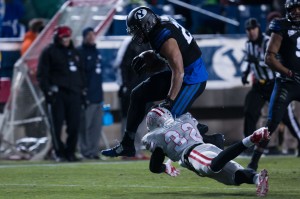Tony Vainuku grew up in Salt Lake City and lived the complexities of the Polynesian community, where football is often considered the way to break cycles of poverty and violence.
“I think that what’s unique is that Polynesians are so new to America and the culture is very dependent on each other and helping each other rise,” Vainuku said. “Everybody giving back. If one makes it, that means everybody else will rise with that as well.”

The experience is detailed in a debut documentary Vainuku spent seven years on. “In Football We Trust” aired Monday on PBS.
“The family is very dependent on one of you making it and creating an opportunity, not for only your immediate family, but for your cousins, aunts, uncles,” Vainuku said. “If you’re related in the Polynesian community, there’s an expectation that you are going to give back and help everyone.”
The documentary was shot over four years and follows the tribulations of four Polynesian high school football players in the Salt Lake City area — BYU linebacker Harvey Langi, Fihi Kaufusi and brothers Leva and Vita Bloomfield.
Former NFL players Troy Polamalu and Vai Sikahema and current players Star Lotulelei and Haloti Ngata are also featured.
“I just wanted to have a more positive influence on young Polynesians making their way through life through football,” Vita Bloomfield said, “coming from whatever struggles they’re coming from. Do not take anything for granted. Seize the opportunity. All the little things count.”
Vainuku, 37, wanted to make the documentary after seeing an uncle with NFL dreams go to prison for 10 years. He said Polynesians are 28 times more likely than any other ethnic group to make it to the NFL. The 2010 census says Native Hawaiians and other Pacific islanders make up 0.4 percent of the population.
Polynesian communities have fallen into the similar trappings of other minority groups where struggling economics can lead to crime.
“I’ve personally witnessed a lot of the misunderstanding, misrepresentation and, to be honest, blatant racism our local community is still combatting,” said director Erika Cohn, who is from Salt Lake City.
“What’s unique about this story is the cultural, religious aspects… The Pacific islander cultures are incredibly family oriented and there’s an alignment with the church in that way and there’s also an alignment with football. Culture, religion and football don’t always align.”




